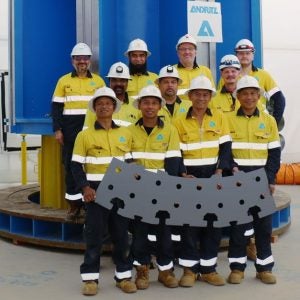A pumped storage project is one of five energy storage projects across the UK that is set to benefit from a share of over £32 million government funding in the second phase of the Longer Duration Energy Storage (LODES) competition.
RheEnergise Ltd will receive £8.24 million to build a demonstrator near Plymouth of their ‘High-Density Hydro®’ pumped energy storage system. The system uses an environmentally safe mineral-rich fluid more than two and half times denser than water, to create electricity from gentle slopes, without requiring steep dam walls or high mountains like traditional hydropower. The project will use surplus electricity to pump the fluid uphill, then later when electricity is needed by the grid, the fluid will be released back down the hill through turbines to generate electricity.
“Over the next decade, Long Duration Energy Storage can make an important contribution to the UK energy market, and indeed globally. Long Duration Energy Storage is a key to delivering the energy transition and will help strengthen the resilience and security of the UK’s energy system. It will be essential to the effective operation of the grid as it balances intermittent renewable generation, it helps to create effective base-load power from renewables, whilst at the same time keeping costs low. Our storage system offers a solution,” commented Stephen Crosher, Chief Executive of RheEnergise Ltd. “BEIS’s contract is incredibly welcome and will enable us to accelerate the commercial deployment of our High-Density Hydro® storage system in the UK and overseas. With the BEIS contract in place, we will be seeking planning consent for our Devon project before the end of the year.
“We are also pursuing a number of project opportunities elsewhere in the UK, continental Europe and Canada. Drawing upon our work in Devon and the government’s welcome support, we expect to have our first 5MW grid-scale project in operation in 2026.”
The funding announced yesterday follows the first phase of the LODES competition, which saw £2.7 million awarded to 19 projects. This second phase provides further funding to the most promising projects from Phase 1, enabling them to build prototypes and demonstrators to bring their projects to life.
The LODES competition provides government backing to accelerate the development and commercialisation of innovative energy storage technologies, in turn supporting the UK’s transition to relying on renewables, while also encouraging private investment and new green jobs – with an estimated 100 jobs supported through these projects.
The other projects that received funding include: StorTera Ltd, based in Edinburgh, will receive £5.02 million to build a prototype demonstrator of its sustainable, efficient, and highly energy dense single liquid flow battery (SLIQ) technology; Sunamp Ltd, based in East Lothian, will receive £9.25 million for a project that will trial its advanced thermal storage system in 100 homes across the UK; The University of Sheffield will receive £2.60 million to develop a prototype modular thermal energy storage system, enabling optimised, flexible storage of heat within homes, providing benefits for both the occupant and the grid. The protype energy systems will be manufactured by Loughborough University and deployed at the Creative Energy Homes campus at the University of Nottingham, demonstrating the technology within lived-in homes; EDF UK R&D, in partnership with the University of Bristol, Urenco and the UK Atomic Energy Authority (UKAEA), will receive £7.73 million to develop a hydrogen storage demonstrator utilising depleted uranium at UKAEA’s Culham Science Centre in Abingdon, Oxfordshire.






